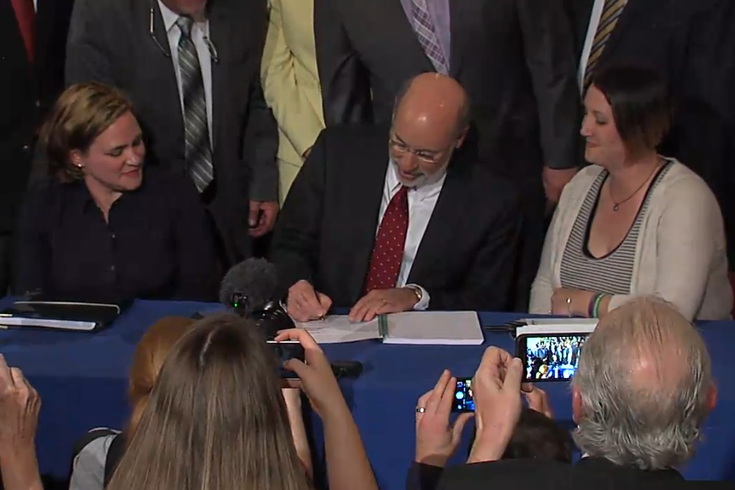
April 20, 2016
 Governor Tom Wolf/Source
Governor Tom Wolf/Source
Pennsylvania Gov. Tom Wolf signs a bill into law legalizing medical marijuana in the state on Sunday, April 17, 2016.
As Pennsylvania Gov. Tom Wolf and state lawmakers shift focus from legalizing medical marijuana to establishing a functional statewide network to distribute it, one possible interim option could be to import the drug from one of 23 other states that already have the infrastructure in place.
While the medical marijuana bill officially takes effect 30 days after Gov. Wolf signed it on April 17, the timeline to develop an operative system -- growers, processors, dispensaries and providers -- is expected to take between 18-24 months.
Appearing for a radio interview Tuesday afternoon on Pittsburgh's CBS affiliate 1020 KDKA, Gov. Wolf suggested that qualified Pennsylvania patients should be able to have access to medical marijuana much sooner than that.
“People should be able to start using these medicines really quickly. If someone were to go to another state and buy it legally and bring it back for medicinal purposes, I kind of doubt that most prosecutors would pursue a case even right now ... We are trying to give relief to families, and I think it would be much appreciated by the families and it would be consistent with the will of the General Assembly and the people they represent … This is relief we’d like to be able to start getting as soon as possible.”
Under the new law, patients suffering from one of 17 qualifying conditions — including, but not limited to, cancer, HIV/AIDS, multiple sclerosis, seizures and autism — will be able to access the drug in pill, oil or ointment form. Patients and caregivers participating in the program will receive certified identification cards from the Pennsylvania Department of Health.
On the production and distribution side, the state will authorize up to 25 marijuana growers and processors while allowing as many as 50 dispensaries each to operate three locations in Pennsylvania.
During his radio appearance, Wolf emphasized that the legalization of medical marijuana does not suggest the state will immediately consider legalization for recreational purposes, though some localities have eased back on penalties for possession of small amounts.
“The two aren’t linked at all,” Wolf said. “This is not a gateway to anything other than reinforcing what we’ve always done, and that is [to] allow doctors, encourage doctors, to do what they can do to make the lives of their patients more comfortable.”